Abstract
The present article focuses on presenting a study case and the related qualitative methodology research of an in-service teacher training based on a task-based learning approach within JOBS Project - Job Orientation training in businesses and schools. The project has been developed in joint co-operation by the Ministry of Education and Scientific Research, the National Centre for the Development of Technical and Vocational Education, the Centre for International Projects in Education of Zurich University of Teacher Education and the University of Bucharest. Its implementation started in 2012 and will end in June 2017 and covers 4 regions at national level. In recent years some of the debates in the instructional field focused on which approaches to structuring, planning and implementing lessons are more effective. Some responses focused on TBL offering specific advantages of the approach: a natural context developed from the learner’s experiences that is personalized and relevant to them as well as problems that lead to something useful and meaningful. This premise tested first on students, was further extended to teachers’ training program with promising perspectives.
Keywords: In-service teachers’ training programtask based learninge-learning platformcareer guidance
Introduction
One of the most relevant indicators of the quality and effectiveness of education, training systems and
the employability of school graduates is the number of young people (between 15-24 years) who are
employed or in an education or training programme. In Romania, the rate of young people (under 25) who
have failed to integrate into the labour market is 23.1%, a rate even higher that the European average
(European Commission, 2016) which means that Romania faces a major challenge in raising the quality of
its education and training system as it registers a high and increasing share of young people failing to start a
professional career (Council of the European Union, 2013).
1.1.JOBS Project Presentation
In co-operation with the Ministry of National Education and Scientific Research, the National Centre
for Technical and Vocational Education and Training Development (NCTVETD) and the University of
Bucharest (UB), the Centre for International Projects in Education (IPE) at the Zurich University of Teacher
Education has developed the programme JOBS from 2011 onwards, in order to counteract the threat of a lost
generation. The project is co-financed by Switzerland through The Swiss-Romanian Cooperation
Programme to Reduce Economic and Social Disparities within the Enlarged European Union.
considering educational policies to develop a better system to prepare Romanian students in the last years of
compulsory education and during their studies at the technical colleges to become acquainted with the real
working world. The JOBS project also provides corresponding support for teachers in terms of training,
mentoring and continuous up-date on relevant information in the field.
More precisely, JOBS’ goal is to prepare the students in: a) acquiring life skills and competences, b)
developing a realistic perception of job opportunities and work life in their region and c) taking a decision
about their further education and thereby their professional career. This happens by introducing a new cross-
curricular approach, adequate teaching-learning methods (TBL, cooperative and collaborative learning) and
a series of seven new text-booklets for students and also by providing corresponding support for teachers in
terms of training, mentoring and constant up-date via a distance-learning platform. Students actively explore
businesses, companies or public institutions offering jobs in their region, research about employment
opportunities, analyze economic conditions and prepare their collected data for presentations and
documentation in a project-oriented way.
As regards the teachers’ training programme, it went through two stages so far: (1) first, they were
invited to improve their teaching in this new subject through direct immersion and peer teaching support
elements, while (2) second, a more structured training program which was developed and implemented
starting with 2013 by means of an e-learning platform that focuses on a self-reflective, project-oriented and
didactically up-to-date approach of teaching and learning as well as a mentorship programme. Face-to-face
sessions, tasks completed on the e-learning platform, visits, JOBS fairs and examples of lessons were
activities that were especially developed for this training program. Specific materials were developed as well
as specific learning tasks for teachers designed as their training program also is developed on a TBL
approach requiring preparation, implementation and reflection. Each year starting with 2013 a session for
mentors’ training was also developed.
Paper Theoretical Foundation and Related Literature
2.1.Task Based Learning Approach
TBL was at first developed as a different way to teach languages, as it can help the student by
placing him/ her in a situation like in the real world. Based on empirical research, TBL adopts meaning-
based, communicative tasks as the central unit for defining language learning needs, determining curriculum
goals, designing activity in the (language) classroom, and assessing language competencies. TBL has the
advantage of getting the student to use his/ her skills at his/ her current level and to develop language
through its use. It has the advantage of getting the focus of the student toward achieving a goal where
language becomes a tool, making the use of language a necessity (Nunan, 2004). That means a task can be
anything from doing a puzzle to making an airline reservation. It is important for the students to experience
the principles of TBL frequently in different contexts. A good task that gives rise to many problems that
need to be solved is the best means to create a productive and exciting learning environment.
By generalizing to subjects other than languages (what actually happens in JOBS), we could say that
TBL: (i) allows for a needs analysis to be matched to identified student needs; (ii) is supported by the
research findings of student/classroom-centered learning; (iii) allows evaluation to be based on testing
referring to task-based criterion; (iv) allows for form-focused instruction.
According to Rod Ellis (2003)
focus on (pragmatic) meaning; (2) a task has some kind of ‘gap’; (3) the participants choose the resources
needed to complete the task; (4) a task has a clearly defined outcome.
2.2 Task Based Learning In JOBS Project
In JOBS students, teachers and mentors learn via TBL (Weidinger, Keller, & Gollob, 2014a). The
implementation of JOBS tasks for students (Weidinger, Keller, & Gollob, 2014b) went through some
changes over the years which challenged teachers in numerous ways even beyond the issue of TBL. At the
beginning of the project, the schools where JOBS was implemented (two classes for each level) granted 3
hours from the school based curriculum in order to allow the classes to take place. In the second phase, a
more integrated perspective was considered. Each school pointed out three teachers who would team up
while all having school hours with the same class (there was only one class selected at this point from each
school) who integrated JOBS tasks within their own discipline (at Romanian, or mathematics, or English,
etc.). This meant a careful analysis of one’s discipline of study, communication with the other two
colleagues and sharing students’ assignments from the JOBS booklets also considering the specificity of
each discipline of study. This fact is important to underline because teachers acted as curriculum
transformers, instructional designers and actual leaning facilitators.
The first generation of teachers (2012-2013) was not provided with any means of theoretical training
on the subject of TBL, but only some model lessons and then emerged in the situation. However, once the
number of teachers involved in the project grew a more systematic approach felt right to implement.
Today, teachers of all participating schools have the possibility to attend the accredited JOBS-distance-learning training based on a TBL approach consisting of: (a) face-to-face trainings, (b) 9 (at first 14) online assignments/ tasks including also training videos, which can be worked on individually or in groups, (c) mentors support who give feedback and advice. Additionally, JOBS-model lessons are presented once or twice a year demonstrating a classroom situation applying JOBS-methods. There were
designed a set of complex, meaningful tasks that teachers have to go through during a school year and report
on how they designed, implemented and reflected at the results.
As far as the teachers’ learning materials are concerned, starting with 2014 the teacher booklet was
developed which offered input for implementing JOBS students’ booklets. Furthermore since 2013, 3
preparatory modules were developed: (1) one focused on the use of e-learning platform; (2) one focused on
student-centered pedagogy and the development of personal and professional competences; (3) one focused
on career management.
All teachers’ assignments/ tasks followed a linear logic carrying the learner through 3 steps while
trying to actually put in practice the TBL approach:
- Before class – description – focus point is placed on using the pedagogical concepts in a set of
exercises that prove the level of knowledge and understanding – this reflects the moment of preparing for
the class activity while understanding the working paradigm;
- During class – experience - here the teacher is asked to analyse and describe some real-life
situations in class where the concepts are actually implemented;
- After class – reflection – this is an exercise which requires analysis and interpretation, based on the
experience (previous activity) and which focuses on identifying strengths and weaknesses (what worked out
and what did not according to their expectations, proposals for introducing changes in their own further
practice, etc.).
The JOBS mentors themselves were selected from the first two generations of JOBS teachers who in
this new role participated in time at training sessions (also based on TBL perspective) in order to be able to
give feedback and develop a trust-based communication with the new generations of teachers. Each mentor
took over each year the responsibility to guide and offer support for maximum 6 trainees. The mentors’
training sessions were offered once or twice a year by a team of Swiss and UB experts.
Methodology
In order to measure the outcome of the training activities both on students and teachers a complex
methodology was put in place and thus, the on-going outcome measurement study focused on observing the
impact on the level of students and teachers. In the research activity were involved in different stages and
areas both Swiss and Romanian representatives.
First, the JOBS-research was designed as an intervention study in a pre-post-design, with intervention- and control-groups. This part of the research was led by the Swiss team. Students as well as teachers from JOBS and Non JOBS classes were involved in the surveys. The goals of JOBS-research were (1) to evaluate the effect of JOBS-implementation and (2) to reach capacity building and knowledge transfer through this cooperation. The requirement to reach the goals on both levels is a very demanding process.
Beside this study as described in the project proposal documents, there was performed an additional evaluation overtime, namely a
Results
The distance learning programme was developed and accredited by the Ministry of Education in
2013 and its implementation started in October 2013 with the first form of the tasks and training sessions (in
time they all undertook revisions depending on the feedback from teachers and mentors, while the number
of assignments decreased from 14 to 9).
The present article focuses only on presenting the analysis of the training programme and some
results related to teachers’ activity on the e-learning platform, research led by the UB experts. The analysis
of the activity carried out on the e-learning platform by the trainees and mentors was each time performed
before the final evaluation and it provided quantitative data and qualitative interpretation in connection with:
(a) the assignments uploaded by each trainee; (b) the feedback provided by the mentors; (c) the marks
provided by the mentors. The findings resulted from this detailed analysis were discussed during the final
evaluations and during the mentors’ training sessions with the aim to improve the mentoring activity. The
final evaluation of each series of trainees within the accredited programme was performed in June at the end
of the school-year based on developed evaluation criteria that were developed and approved by the trainers’
and mentors’ teams.
1. First year activity results. The final evaluation of the first series (2013-2014) of trainees within the
accredited programme was performed in June 2014 based on developed evaluation criteria. The e-learning
activity results show that out of 79 teachers enrolled in the training course, 92.40% graduated it with the
following scores: 9% satisfactory, 32% good, 52% very good. Figure
activity on the platform:
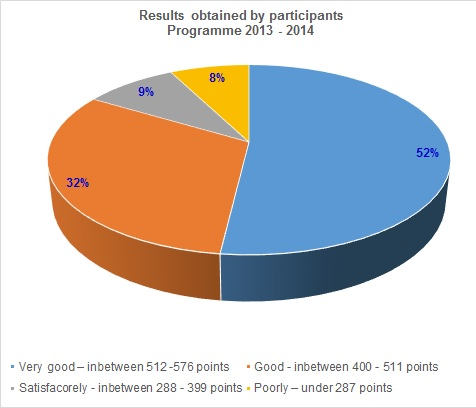
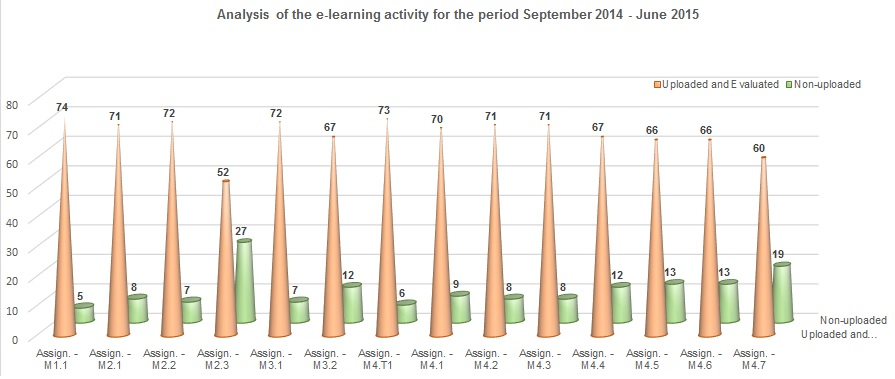
It can be noticed that from 79 trainees who were on the platform in the beginning of the e-learning
program, only 73 were assigned to mentors and kept in touch with them (the rest of them quitted due to the
complexity of the programme and tasks). Most problems encountered during the training programme in
relation to the activity on the platform were: how to access the platform, downloading and uploading of
documents introduced by the trainees and uploading the feedback. However, the qualitative interpretation of
results long term classic teaching experience has a strong impact on the teachers’ activity and the change
brought by the new concept TBL was quite difficult to assume and implement (figure
The 2013 – 2014 school year, was the first year in which mentors began to work on the e-learning
platform and for this reason the beginning of mentoring activity was slow, and raised numerous issues. Each
mentor had work with a group of trainees that was designated at the beginning of the training program and
help them go through the assignments and the practice. The most important results were reached in the
second part of the program when mentors began to give a real feedback to the trainees. Formative feedback
was scarcely used at first (only 20%), which highlighted the need for a training course on the topic. In about
70% of cases, there weren’t suggestions for improvement, even though the solved assignments had to
undergo changes. In only 55% of the analyzed tasks, there was agreement between the scores awarded by
the mentors and the quality and completeness of the uploaded assignments.
2.Second year activity results. The final evaluation of the second series (2014-2015) of trainees
within the accredited program was performed in June 2015 based on the developed evaluation criteria. The
results showed that out of 138 teachers enrolled in the training course, 89.13% graduated it with the
following scores: 12% satisfactory, 25% good, 52% very good. Figure
the platform:
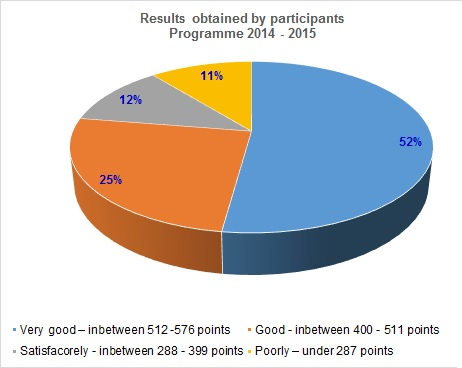
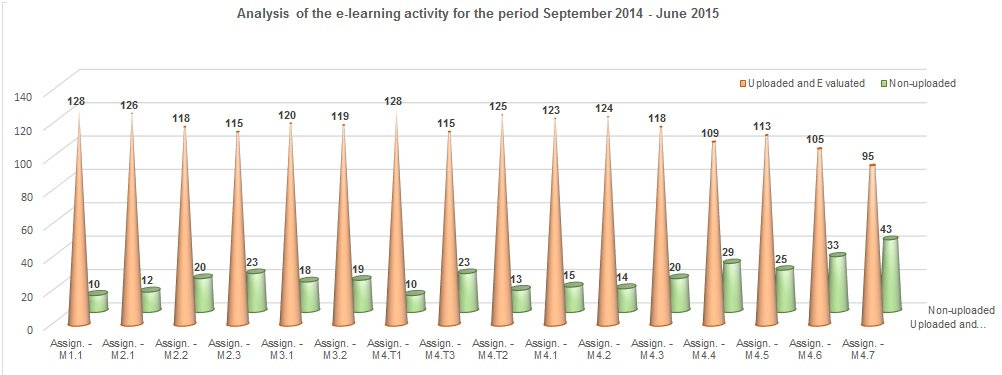
It can be noticed that from 145 trainees who were on the platform in the beginning of the e-learning
program, only 138 were assigned to mentors and kept in touch with them (the rest of them quitted due to the
complexity of the programme and tasks). The quantitative analysis showed the fact that by the end of the
year and the last assignments, both trainees and mentors lose the interest in solving their tasks (figure
general, the assignments were treated in theoretical terms. Very few participants were effectively involved
in solving the assignments. Approximately 50% of trainees do not understand the concepts of TBL and
differentiated learning based on the answers to the assignments. Sometimes the responses were very
succinct and formal especially related to their own reflection.
Regarding the
year, the mentors’ activity improved. All mentors completed and forwarded to the trainees the assessed
assignments based one evaluation criteria. Formative feedback was encountered in most evaluations. In
about 50% of cases, there weren’t suggestions for improvement, even though the solved task had to undergo
changes. In about 70% of the analyzed tasks, there was agreement between the score awarded by the mentor
and the quality of uploaded answers. Still there were circumstances in which 33-36 points were granted very
easily, for papers that should not have scored higher than 30.
3.Third year activity results. The final evaluation of the third series (2015-2016) of trainees within
the accredited program was performed in June 2016. The evaluation results showed an activity improvement
because 94.50% of teachers enrolled in the training course (206 trainees out of 218) graduated it with the
following scores: 10% satisfactorily, 39% good, 46% very good. Figure
platform.
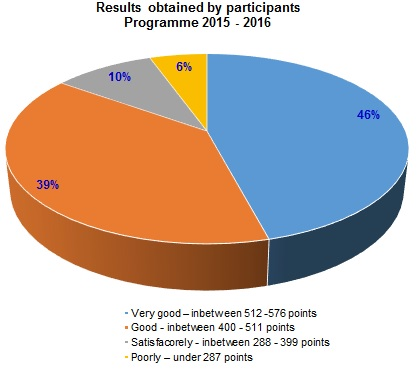
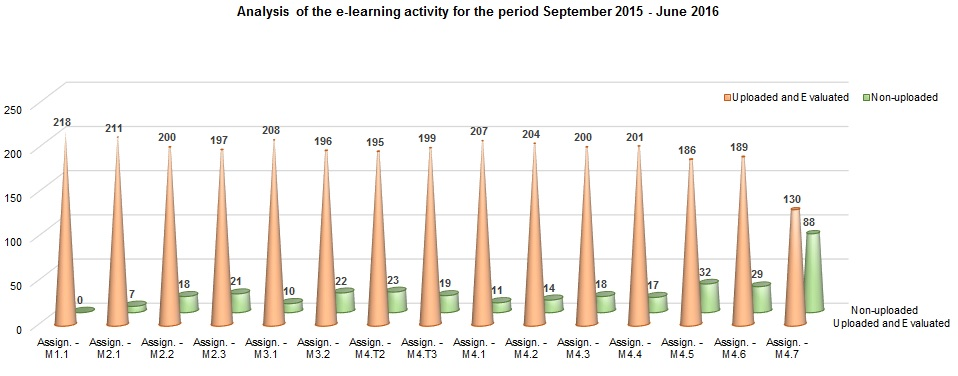
The quantitative analysis of the assignments shows that the number of satisfactory and poor scores
diminished comparatively with the 1st and 2nd year of program. The improvement arises from the fact that in
the spring of 2015, the management team organized several promotion sessions in order to better prepare
schools for incoming 2015 – 2016 training program. If in the previous stages, the majority of assignments
were treated in theoretical terms, at this stage, the majority of participants were effective involved in solving
the assignments.
Approximately 80% of trainees understand the concepts of TBL and differentiated learning based on
their answers to the assignments. They succeeded to apply TBL in class, and to describe their job in class,
for a specific task from the students’ JOBS booklet, according to the Assignment requests. Also, the
majority of them succeeded to express their own reflections and team working for JOBS class was not a
problem anymore. Still we can observe that trainees prefer to not solve the final assignments, probably
because in that period of time (May – June) they have a lot of curricula and administrative work (figure
The analysis of the
an impressive improvement. We believe that this was the result of the serious training sessions to which all
the mentors participated. Formative feedback was encountered in most evaluations after a strong
communication between mentors and trainees. The analysis of the uploaded assignments and mentors’
evaluations indicated that mentors gave a lot of suggestions for improvement, which helped trainees to
understand the tasks and make changes. In about 90% of the analyzed tasks, there was agreement between
the scores awarded by the mentor and the degree of problem solving from the uploaded assignment.
Discussion
The discussion based on the research results related to the activity undertaken by trainees and
mentors on the e-learning platform brings into light some issues that concerned the UB team during the
years.
In general, the assignments/ tasks are treated mainly on a theoretical note; only few trainees
succeeded to solve the real task of the assignments, namely to prove the TBL approach and transfer it to
their practice. This is an issue that appeared in the first year and continued to happen during the next years
although there was noticed a decreasing trend, while the third year brought a real improvement. Teachers are
usually more prone to present some theoretical knowledge or to discuss an activity at a very general level, or
focusing more on students’ activity even when they are specifically asked to refer to their own activity in the
classroom. Many of them even prefer to discuss at the third person. Very rarely one can find actual
recording of class activity, an actual description of the events. For the mentors it was always a challenge to
offer them feedback in these circumstances. We can explain this behaviour based on similar experiences but
also on discussions with the teachers: it is easier for them to copy-paste some theoretical knowledge from a
book than actually describe what they have done; lack of this kind of exercise in general – they are not very
often challenge to discuss their experiences – even the exams (related to teaching career) are mostly
theoretical and so they are used to reproduce some book often without even understanding the theory; lack
of time necessary to invest in such an approach (many of them complained over time about their
involvement in different activities as well as the paper work they are due to fill in regularly). So this is not
the case only with the JOBS project but a general problem.
Assignments evaluation by all mentors was done on the basis of the assessment criteria developed. It
was quite challenging for mentors to offer formative feedback. Not that often the evaluation is accompanied
by rationale or reasoning or the feedback includes suggestions for improvement, even if the solved
assignment should undergo changes. Sometimes the mentors failed to detach themselves from their
colleagues who attend the training program that led to a more subjective assessment.
Conclusions
The results of the project are quite inspiring. At present, the schools in which the project was
implemented are interested in further developing the project bringing in new classes. Teachers admitted
some very impressive cases when students usually with behavioral problems proved to change and get
engaged in the activities proposed by the project sometimes even more than the rest of their colleagues
because they found the topics approached and the methods of learning relevant and meaningful. Regarding
TBL teachers believe that this method is quite useful for their discipline of study and has real impact on
students. One point that can be improved is creating a community of practices. For teachers it was truly a
challenge to work together at all levels: mentors – teachers, teachers from the same school. However, once
the tools or the environment was established and assumed, the results improved.
The JOBS topics were discussed also when the new syllabuses for Counselling and orientation were
developed and now they are a reference for these classes as well.
Some of the teachers acknowledged the change they went through. Although the programme was
quite challenging, they admitted its impact and usefulness.
References
- ***. (2016). JOBS - Job Orientation Training in Businesses and Schools. Retrieved from
- http://www.jobsproject.ro/ro/
- Council of the European Union. (2013). Council Recommendation on Romania’s 2013 national reform programme and delivering a Council opinion on the Convergence Programme of Romania, 2012-2016. Retrieved from http://ec.europa.eu/europe2020/pdf/csr2013/romania/csr2013_council_romania_en.pdf Ellis, R. (2003). Task-based Language Learning and Teaching. Oxford: Oxford University Press.
- European Commission. (2016). Database. Retrieved from Eurostat: http://ec.europa.eu/eurostat/data/database Nunan, D. (2004). Task-based language teaching. . Cambridge: Cambridge University Press.
- Weidinger, W., Keller, M., & Gollob, R. (2014a). Introductory Brochure - Didactical Approach and Use of Material. Retrieved from http://www.jobsproject.ro/ro/for-teachers-ro/material-teachers-ro.html Weidinger, W., Keller, M., & Gollob, R. (2014b). JOBS Booklets 1-7 and Toolbox for Teachers and Students. Retrieved from http://www.jobsproject.ro/ro/for-teachers-ro/material-teachers-ro.html
Copyright information

This work is licensed under a Creative Commons Attribution-NonCommercial-NoDerivatives 4.0 International License.
About this article
Publication Date
25 May 2017
Article Doi
eBook ISBN
978-1-80296-022-8
Publisher
Future Academy
Volume
23
Print ISBN (optional)
-
Edition Number
1st Edition
Pages
1-2032
Subjects
Educational strategies, educational policy, organization of education, management of education, teacher, teacher training
Cite this article as:
Mironov, C., Popovici, A., & Ionica, E. (2017). JOBS Project – A Task Based Learning Approach To Teachers` In-Service Training. In E. Soare, & C. Langa (Eds.), Education Facing Contemporary World Issues, vol 23. European Proceedings of Social and Behavioural Sciences (pp. 746-755). Future Academy. https://doi.org/10.15405/epsbs.2017.05.02.91

